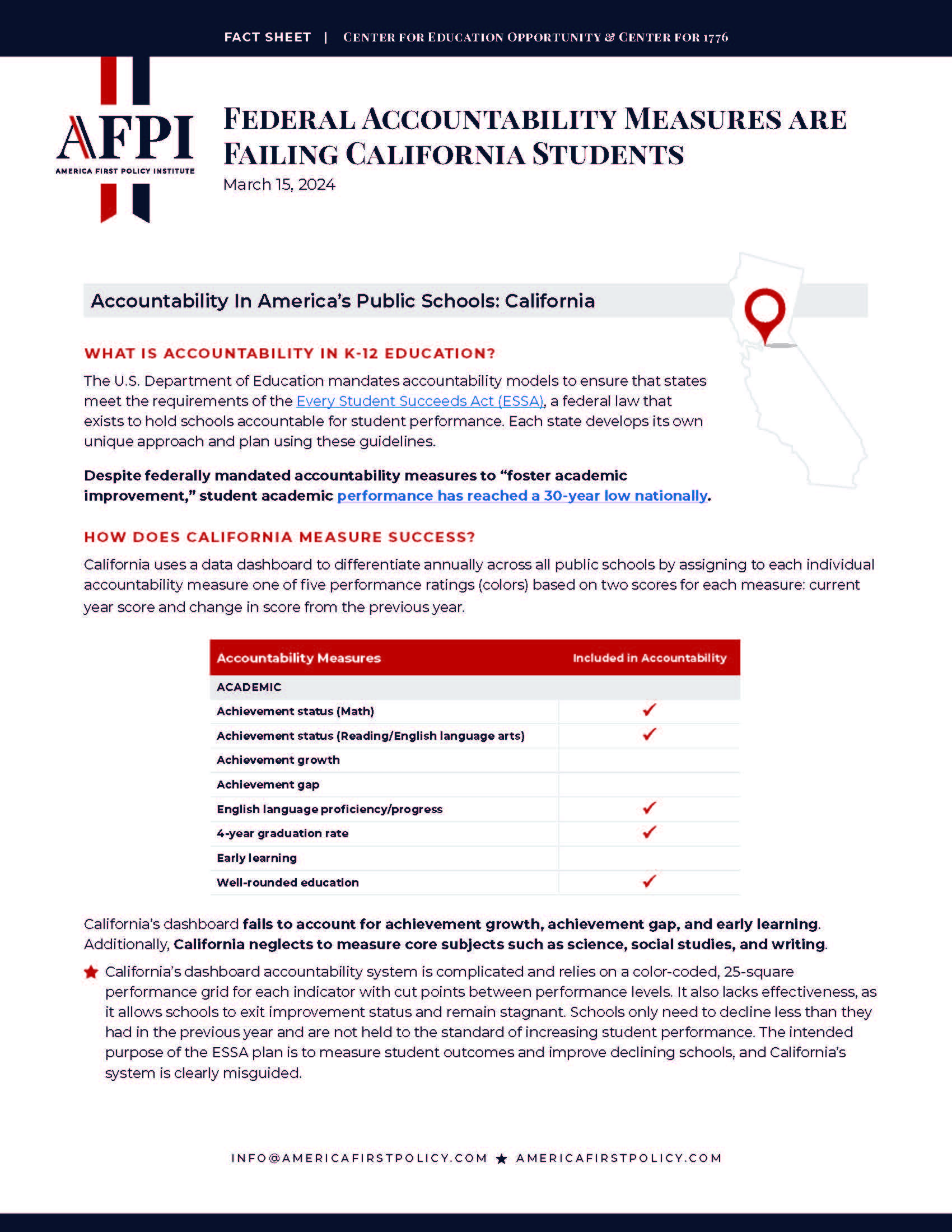Federal Accountability Measures are Failing California Students
Accountability In America’s Public Schools: California
WHAT IS ACCOUNTABILITY IN K-12 EDUCATION?
The U.S. Department of Education mandates accountability models to ensure that states meet the requirements of the Every Student Succeeds Act (ESSA), a federal law that exists to hold schools accountable for student performance. Each state develops its own unique approach and plan using these guidelines.
Despite federally mandated accountability measures to “foster academic improvement,” student academic performance has reached a 30-year low nationally.
HOW DOES CALIFORNIA MEASURE SUCCESS?
California uses a data dashboard to differentiate annually across all public schools by assigning to each individual accountability measure one of five performance ratings (colors) based on two scores for each measure: current year score and change in score from the previous year.
California’s dashboard fails to account for achievement growth, achievement gap, and early learning. Additionally, California neglects to measure core subjects such as science, social studies, and writing.
- California’s dashboard accountability system is complicated and relies on a color-coded, 25-square performance grid for each indicator with cut points between performance levels. It also lacks effectiveness, as it allows schools to exit improvement status and remain stagnant. Schools only need to decline less than they had in the previous year and are not held to the standard of increasing student performance. The intended purpose of the ESSA plan is to measure student outcomes and improve declining schools, and California’s system is clearly misguided.
THE NATIONAL ASSESSMENT OF EDUCATIONAL PROGRESS (NAEP), THE LARGEST NATIONAL ASSESSMENT, IS THE GOLD STANDARD FOR REPORTING OUR NATION’S EDUCATIONAL PROGRESS. WHAT DO THE LATEST NAEP RATINGS SHOW ABOUT THE EFFECTIVENESS OF CALIFORNIA’S ESSA PLAN?
In 2022, according to the National Assessment of Education Progress (NAEP) in California:
- The reading level of 4th grade students who performed at or above the NAEP Proficient in was only 31%.
- Black 4th grade students had an average score that was 31 points lower than that for White students.
- Hispanic 4th grade students had an average reading score that was 29 points lower than that for White students.
- Low-income 4th grade students had an average reading score that was 34 points lower than that for students from middle and high income families.
RESTORING EDUCATION EXCELLENCE IN CALIFORNIA: TWO VITAL ACTIONS ARE NEEDED: HEIGHTENED TRANSPARENCY AND SHARPENED ACCOUNTABILITY.
- Congress and states must reexamine their enforcement of federal accountability mandates for monitoring student performance, providing crucial data to assess the damage and guide effective interventions.
- State assessment systems must modernize, and tests should reflect current curricula. California’s model should deliver timely, actionable data regarding student progress and school performance to educators and parents.
- Accountability measures should be designed and implemented at the state level. A one-size-fits-all federal accountability model is counterproductive.
- To promote accountability and increase transparency, California should:
- Increase parental involvement by upholding federal laws that ensure parents the right to observe the activities being performed in the classroom and access to any survey materials about their children (20 U.S.C. § 6318; 20 U.S.C § 1232h).
- Train elected school board members to review curriculum and ensure that students have access to evidence-based curricula that positively affect student outcomes over time.
- Install video cameras in classrooms to record class sessions, track student progress, monitor curriculum implementation, and increase safety.
- Abolish teacher tenure in K–12 education, which currently does not require proof or performance metrics, leading to lower rates of teacher performance.
